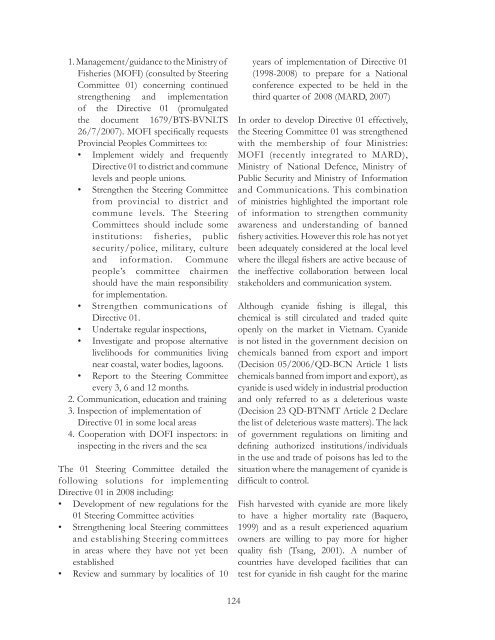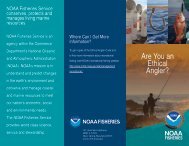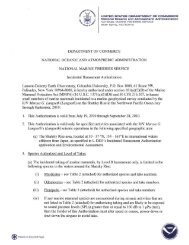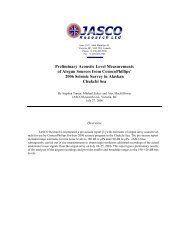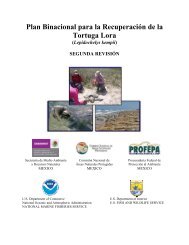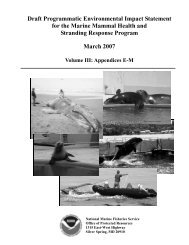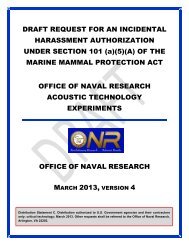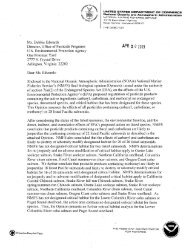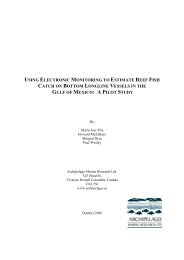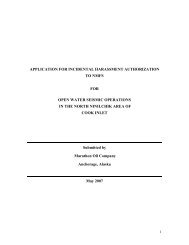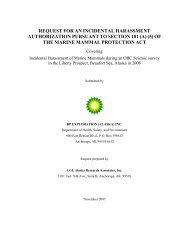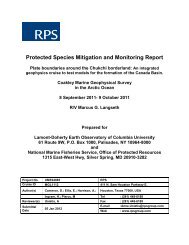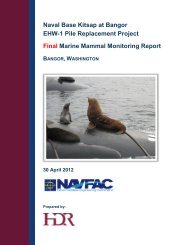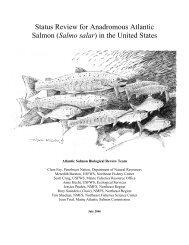Proceedings of the International Cyanide Detection Testing Workshop
Proceedings of the International Cyanide Detection Testing Workshop
Proceedings of the International Cyanide Detection Testing Workshop
You also want an ePaper? Increase the reach of your titles
YUMPU automatically turns print PDFs into web optimized ePapers that Google loves.
1. Management/guidance to <strong>the</strong> Ministry <strong>of</strong><br />
Fisheries (MOFI) (consulted by Steering<br />
Committee 01) concerning continued<br />
streng<strong>the</strong>ning and implementation<br />
<strong>of</strong> <strong>the</strong> Directive 01 (promulgated<br />
<strong>the</strong> document 1679/BTS-BVNLTS<br />
26/7/2007). MOFI specifi cally requests<br />
Provincial Peoples Committees to:<br />
•<br />
•<br />
•<br />
•<br />
•<br />
•<br />
Implement widely and frequently<br />
Directive 01 to district and commune<br />
levels and people unions.<br />
Streng<strong>the</strong>n <strong>the</strong> Steering Committee<br />
from provincial to district and<br />
commune levels. The Steering<br />
Committees should include some<br />
institutions: fisheries, public<br />
security/police, military, culture<br />
and information. Commune<br />
people’s committee chairmen<br />
should have <strong>the</strong> main responsibility<br />
for implementation.<br />
Streng<strong>the</strong>n communications <strong>of</strong><br />
Directive 01.<br />
Undertake regular inspections,<br />
Investigate and propose alternative<br />
livelihoods for communities living<br />
near coastal, water bodies, lagoons.<br />
Report to <strong>the</strong> Steering Committee<br />
every 3, 6 and 12 months.<br />
2. Communication, education and training<br />
3. Inspection <strong>of</strong> implementation <strong>of</strong><br />
Directive 01 in some local areas<br />
4. Cooperation with DOFI inspectors: in<br />
inspecting in <strong>the</strong> rivers and <strong>the</strong> sea<br />
The 01 Steering Committee detailed <strong>the</strong><br />
following solutions for implementing<br />
Directive 01 in 2008 including:<br />
• Development <strong>of</strong> new regulations for <strong>the</strong><br />
01 Steering Committee activities<br />
•<br />
•<br />
Streng<strong>the</strong>ning local Steering committees<br />
and establishing Steering committees<br />
in areas where <strong>the</strong>y have not yet been<br />
established<br />
Review and summary by localities <strong>of</strong> 10<br />
124<br />
years <strong>of</strong> implementation <strong>of</strong> Directive 01<br />
(1998-2008) to prepare for a National<br />
conference expected to be held in <strong>the</strong><br />
third quarter <strong>of</strong> 2008 (MARD, 2007)<br />
In order to develop Directive 01 effectively,<br />
<strong>the</strong> Steering Committee 01 was streng<strong>the</strong>ned<br />
with <strong>the</strong> membership <strong>of</strong> four Ministries:<br />
MOFI (recently integrated to MARD),<br />
Ministry <strong>of</strong> National Defence, Ministry <strong>of</strong><br />
Public Security and Ministry <strong>of</strong> Information<br />
and Communications. This combination<br />
<strong>of</strong> ministries highlighted <strong>the</strong> important role<br />
<strong>of</strong> information to streng<strong>the</strong>n community<br />
awareness and understanding <strong>of</strong> banned<br />
fi shery activities. However this role has not yet<br />
been adequately considered at <strong>the</strong> local level<br />
where <strong>the</strong> illegal fi shers are active because <strong>of</strong><br />
<strong>the</strong> ineffective collaboration between local<br />
stakeholders and communication system.<br />
Although cyanide fi shing is illegal, this<br />
chemical is still circulated and traded quite<br />
openly on <strong>the</strong> market in Vietnam. <strong>Cyanide</strong><br />
is not listed in <strong>the</strong> government decision on<br />
chemicals banned from export and import<br />
(Decision 05/2006/QD-BCN Article 1 lists<br />
chemicals banned from import and export), as<br />
cyanide is used widely in industrial production<br />
and only referred to as a deleterious waste<br />
(Decision 23 QD-BTNMT Article 2 Declare<br />
<strong>the</strong> list <strong>of</strong> deleterious waste matters). The lack<br />
<strong>of</strong> government regulations on limiting and<br />
defi ning authorized institutions/individuals<br />
in <strong>the</strong> use and trade <strong>of</strong> poisons has led to <strong>the</strong><br />
situation where <strong>the</strong> management <strong>of</strong> cyanide is<br />
diffi cult to control.<br />
Fish harvested with cyanide are more likely<br />
to have a higher mortality rate (Baquero,<br />
1999) and as a result experienced aquarium<br />
owners are willing to pay more for higher<br />
quality fi sh (Tsang, 2001). A number <strong>of</strong><br />
countries have developed facilities that can<br />
test for cyanide in fi sh caught for <strong>the</strong> marine


